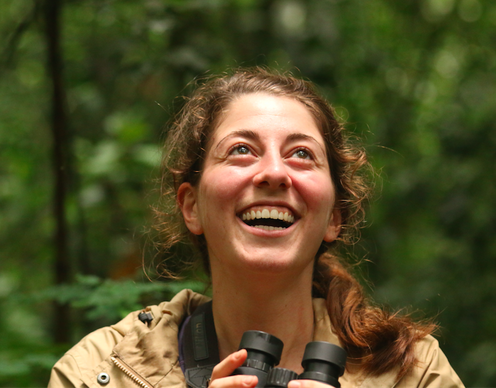|
Smiling for many reasons but particularly because it finally stopped raining so it was much easier to observe the chimps in the tree above me! (This was taken while I was working with the Ngogo Chimpanzee Project in Kibale National Park, Uganda, after I completed my undergraduate degree.) Photo credit: Aaron Sandel/Nathan Chesterman
|
Welcome to my website! Thanks for visiting!
RESEARCH INTERESTS I am fascinated by the evolution and diversity of social behavior across animal species. My research uses evolutionary frameworks and cutting-edge genomic tools to understand how evolutionary processes influence social behavior and reciprocally, how social behavior influences evolutionary processes. To tackle these questions, I integrate lab, field, and computational methods to understand the dynamics between behavior, genomes, and evolutionary processes in natural populations. I am a postdoctoral associate with Andy Clark at Cornell University and a 2024 Cornell Center for Vertebrate Genomics Distinguished Scholar. I completed my PhD at the end of 2022 as part of the University Program in Genetics and Genomics (affiliated with the Evolutionary Anthropology department) where I was advised by Jenny Tung at Duke University. My graduate work leveraged hybrid zones — where two species come into contact and interbreed — as “natural laboratories” (Hewitt 1988) for understanding the relationship between genetic variation and behavior. In hybrid populations, individuals with genomes naturally shuffled by hybridization can be studied in a common environment. Similarly, studying social behavior in hybrid populations can provide insight into key evolutionary outcomes such as the maintenance or collapse of species boundaries. Further, hybridization in and of itself is fascinating! Only a few decades ago, researchers thought that animals rarely hybridized and yet, in recent years, mounting evidence suggests that hybridization is actually quite common and may be the rule rather than the exception. My PhD work focused on answering (i) what maintains taxonomic integrity in the face of gene flow between species, including genetic, behavioral, and ecological barriers, and (ii) the possible costs and benefits to hybridization, including effects on social and mating behavior. Stay tuned for upcoming papers from my PhD research and new work from my postdoc! CONTACT Questions? Comments? Interested in chatting? Feel free to reach out to me via email or Twitter using the icons below! NEWS
May 2024: After >half a year of planning with co-chair Kerry Shaw and the grad student organizing committee (Yuqing Chen and Maddie Ore), we had an exciting Evoday 2024 focused on hybridization, introgression, and admixture! Over 150 attendees from upstate New York area universities attended the all-day symposium, including the major highlight -- the Richard Harrison lecture -- given by Drs. Rosemary and Peter Grant! March 2024: Check out the 2024 tournament of March Mammal Madness (MMM)! I'm excited to join the MMM genetics team to help share some fun facts about your favorite species' DNA! Fill out your bracket before the tournament begins with the WILD CARD round on March 11! And check out specific resources for players, learners, and educators. November 2023: Check out our new paper in Proceedings of the Royal Society B on what determines the early development of grooming behavior--an affiliative social behavior in many social species--in a wild population of baboons, led by Liz Lange and Susan Alberts, with Madison Griffin, Beth Archie, and Jenny Tung! November 2023: Thank you to Cornell's Center for Vertebrate Genomics (CVG) for recognition with a CVG Distinguished Scholar Award! July 2023: Thank you to Cornell for awarding us (my advisor and myself along with our collaborators!) a New Frontier Grant to help fund my postdoc work generating genomic resources for the fascinating Grevy's zebra! July 2023: Research I led as a graduate student was featured as a two-minute takeaway on the The Animal Behavior Podcast's season 3, episode 5! Check out the whole episode including the two-minute takeaway starting at 33:56. June 2023: Thank you to the Society for the Study of Evolution for recognition with the W.D. Hamilton Award for Outstanding Graduate Student Presentation! You can check out all the finalists' talks in the W.D. Hamilton Award Symposium (part 1, part 2, and part 3) as well as my talk starting at 30:50 in part 3. |

